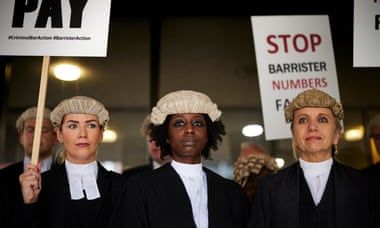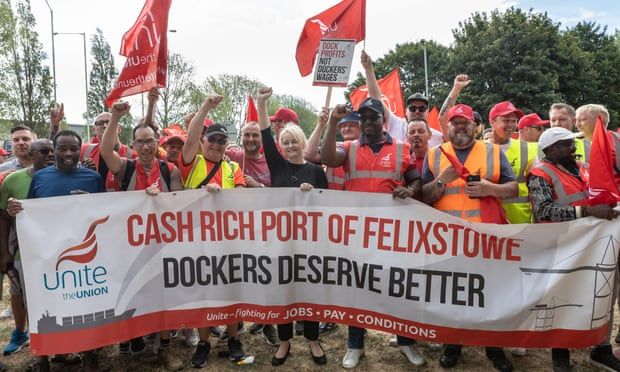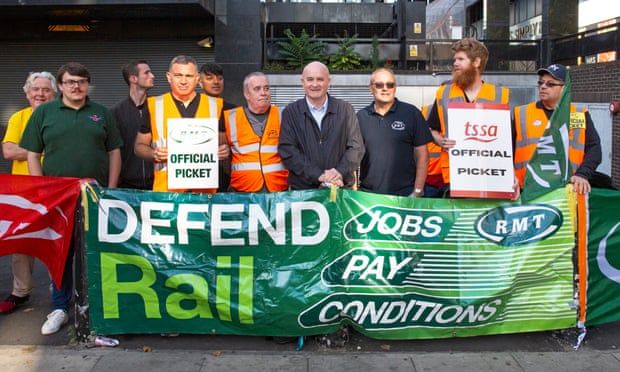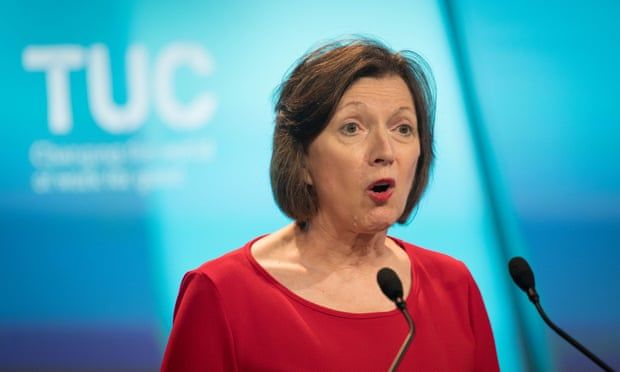
‘People are much angrier now’: why Britain is going on strike
Charlotte Larbi likes working as a Network Rail customer services assistant even if it means the 28-year-old single parent has to clean up the “sick and piss” of drunks at Liverpool Street station from time to time. “They say passengers are still down from before the pandemic, but it seems pretty busy to me. Yesterday we counted 100 cases of MIPs and VIPs [mobility and visually impaired persons] who needed helping on and off trains. And I spent an hour with a passenger who was having a seizure until a relative turned up with the right medication because an ambulance couldn’t come out.”
Larbi believes she’s worth more than the £24,500 she earns a year: a basic rate of £21,500 (with no increase last year) plus £3,000 London weighting – an enhancement less than half what independent estimates say would meet higher living costs in the capital. She had been adding to her £11.81 hourly pay for a 35-hour week with overtime, but says: “I’m in a catch-22. I want to give my son a work ethic and show that you can live without being on benefits. But if I do that, I’m not present for him.” The public have been “pretty good” while she’s picketing, but sometimes people tell her: “I haven’t had a pay rise and I’m not on strike.” “And my response is: ‘Well you should be.’” With everyone “going backwards” because of inflation at 10.1% she says: “I think we’ve started something here.”
That “something” is a wave of strikes, threatened or actual, in transport, BT, Royal Mail, councils, the NHS, a wide range of private companies and now Felixstowe docks and even the criminal bar. After three relatively strike-free decades, it’s a generation – before Larbi was born – since union power was last at the centre of political debate.
 Barristers protesting outside Manchester crown courts on the first day of their strike action.
Barristers protesting outside Manchester crown courts on the first day of their strike action.
Yet despite retro suggestions by ministers such as Grant Shapps that “Marxist union barons” are dragooning their unwilling members back to industrial anarchy, the truth is more mundane and more fundamental. Not only are workers grappling with inflation predicted to go much higher, but unlike in the 1970s, the value of average wages has fallen steadily for 12 years. Christina McAnea, general secretary of the biggest union, Unison, estimates that the real terms wages of her 1.3 million mainly public service members, some at or near the national minimum wage of £9.50 an hour, have fallen by up to 25%.
This is the “long fuse” which TUC general secretary Frances O’Grady believes was finally lit by the pandemic. “Millions of workers got us through Covid,” she says. “For the first time people realised how important their labour was and thought it would be rewarded.” That the “opposite happened” was a “kick in the teeth”. Shapps “describing rail workers as heroes and now suddenly they’re the enemy” is just one example, she says.
Linda Clotworthy, 43, a catering services assistant and Unison rep at Borders general hospital in Melrose where 80% of staff are women, says: “People were clapping the NHS in the streets. But clapping doesn’t pay bills. And clapping doesn’t stop people being assaulted or being off with stress.” Like most Scottish NHS members in Unison, Clotworthy – who, juggling childcare, takes home £18,000 for a part-time 30-hour week including weekends – voted to reject a Holyrood pay offer of 5%, giving three times as much cash to someone on £60,000 than one earning £20,000. “What’s 5% of nothing?” she asks. In England, by contrast, NHS unions have been offered £1,400. “We like the flat rate element,” says McAnea, “but it’s not enough.”
Preparing to strike without an improved offer, Clotworthy says that no one wants to walk out, “but with everything that’s happened lately within NHS, and the sacrifices that staff members have endured, you have to do something”. Without support staff, “who would move the patients from A&E to a ward, or a deceased patient from a ward to the morgue, or cook meals or clean the sheets?”
Anew generation of articulate union leaders is no doubt a factor. But several decisive strike votes in heavily regulated secret ballots suggests that anger is also coming from below. Workers, O’Grady says, have also been “discovering what is happening in boardrooms” – to City bonuses, CEO salaries, up 39% last year to £3.4m on average, and company profits. Sharon Graham of Unite, (which says it has won 80% of 450 separate disputes since she took over and now pays £70 a day to strikers from a £50m strike fund) has been especially adept at emphasising employer profits.
 Unite leader Sharon Graham, centre, with striking dock workers at the picket line in Felixstowe.
Unite leader Sharon Graham, centre, with striking dock workers at the picket line in Felixstowe.
At Felixstowe docks on Wednesday Graham told several hundred striking dockers in orange hi-vis Unite vests, warmed up by speakers blasting out Bob Marley (Get Up, Stand Up) and Aretha Franklin (Respect), that the company made £79m profit last year, distributing £42m to shareholders. It could pay the workers 50% more and still make a profit, she claimed. “So what’s wrong with asking for 10%?” (The company has offered 7%.)
She then promised to apply “leverage” on management by approaching the shipping companies disrupted by the eight-day stoppage and investors in the holding company, CK Hutchinson, controlled by Hong Kong billionaire Li Kai-Shing, “the 32nd second richest man in the world”. This is Graham’s trademark technique of what she calls “strike plus”. Having hired a team of “fantastic forensic accountants” to comb through company results, she says: “I want employers to do well, to make a profit. I just want workers to get a better piece of that pie.”
McAnea, who could be holding strike ballots for about one million Unison members in the NHS and local authorities this autumn, knows she doesn’t have that leverage in public services already in crisis and where staff have traditionally been reluctant to cause further harm by striking. But McAnea says the “mood has changed and people are much angrier”, not just because they feel “cheated” after the pandemic but because they think the services they provide are so poor in some areas that striking won’t make them worse. “Our health workers are saying: ‘We know the consequences of us going on strike, but I’ve had patients sitting in my ambulance for 10, 12 hours. And we need to be doing something that shows the government this isn’t acceptable.’”
The 1970s comparison can be overblown. Strikes are only legal after union members have voted for them in a postal ballot – unlike the online voting allowed even in the Conservative party’s leadership election. When the then (distinctly non-Marxist) railwaymen’s leader Sid Weighell promised in the mid-70s to “put our snouts in the trough like everyone else” after rejecting a 29% pay rise, his union enjoyed a closed shop – now illegal – and no statutory obligation to ballot. It’s a paradox that Margaret Thatcher’s reforms have made strikes more difficult to call but more democratically legitimate when they happen.
With membership halved since the 1979 peak of 13.2 million, unions have struggled to recruit in newer hi-tech and gig economy sectors. Even in clothing sweatshops in centres such as Leicester where mostly immigrant workers report being paid below the minimum wage, membership is close to zero – partly because of memories of the 1970s Transport and General Workers’ Union’s failure to support south Asian workers protesting against racial discrimination at the city’s old Imperial Typewriter factory but mainly because of the employees’ complex relationship with factory owners. Tarek Islam, the son of Bangladeshi-born garment workers, leading a TUC-backed initiative in the sector, explains: “They ask themselves, ‘why would I join a union? I agreed to this [wage] and joining a union will be highly offensive to the factory owner.’ They’ll most likely lose their job and potentially be blacklisted.”
 RMT general secretary Mick Lynch, centre, on the picket line outside Euston station in London, 20 August 2022.
RMT general secretary Mick Lynch, centre, on the picket line outside Euston station in London, 20 August 2022.
Despite GMB and Unite campaigns at Amazon, the GMB’s attempts to negotiate a bigger rise than the 35p on offer, on hourly rates between £10.50 and £11.45, met with flat rejection despite walkouts. One GMB Amazon member says he is more concerned about the mental health impact of an isolated job “stuck in a cage” on a robotic production line than pay. But, he adds: “Amazon are too big and too powerful. If you had 200,000 members protesting, things would happen. But when you’ve got under 5,000 across all their places trying to do this, they’re just laughing.” Longer term, Unite’s Graham envisages UK, German and US unions pressuring corporate and governmental clients of Amazon’s highly profitable cloud business to require “neutrality” deals allowing them to organise such workers.
Despite polling showing the highest support for current strikes among young people, TUC research also shows that lower-paid younger workers are likeliest to be in insecure, less unionised private sector workplaces. Most of these “grandchildren” of the Thatcher era have scant knowledge of unions. Yet it also shows “that younger workers are even likelier to support our values than other workers”, says O’Grady. Raising the proportion of unionised workers aged between 20 and 29 to that across all ages – 23.4% – would bring in another 500,000 members.
That said, as O’Grady puts it: “No other movement would be described as having only 6 million members.” And with membership having grown modestly again from 2016 to 2020, this may now be accelerating. McAnea estimates that Unison membership in the care sector has risen post-pandemic by a third to 150,000: in the sector’s whole beleaguered workforce, only “a drop in the ocean,” she says, “but way more than other unions”.
Politically, the leaders of the highest profile unions are different. McAnea, whose union backed Keir Starmer for the Labour leadership, has had a battle with Unison’s executive, hitherto dominated by far left elements, but decisively won it at conference this summer. The RMT leader Mick Lynch is happy with his union’s decision to disaffiliate rather than be “shackled” to Labour, while Graham has reduced Unite’s affiliation fees to Labour, recasting the union as an industrial organisation rather than immersing it in the party’s “internal machinations”. Arguing that “parliament has been captured by business” she adds: “Labour’s too scared to say that business is wrong even when there’s profit and workers are taking a pay cut. So now we’ve got to be in the workers’ corner.”
But industrially, they appear to disagree about much less. None will publicly rule out a possible general strike, unheard of since 1926. Lynch has threatened widespread “resistance” if Liz Truss fulfils her pledge of fresh draconian curbs on the unions – which McAnea also sees as undermining the “fundamental right of workers to withdraw their labour”.
 TUC general secretary Frances O’Grady. Labour leader Keir Starmer will address next month’s TUC Congress in Brighton.
TUC general secretary Frances O’Grady. Labour leader Keir Starmer will address next month’s TUC Congress in Brighton.
Lynch acknowledges that only the TUC can call a general strike and “they’ll be very worried about the law. To have a lawful dispute is to have a dispute with your employer.” But at next month’s TUC Congress, Unite will propose a motion calling on the TUC to “facilitate and encourage industrial coordination between unions so that workers in dispute can … win”. The aim would be to synchronise – or deliberately stagger – industrial action in separate disputes to maximise their impact.
Andrew Bailey, the Bank of England governor, has argued that workers seeking pay rises to protect themselves from inflation will make the problem worse, declaring that “the people who are least well-off … are worst affected because they don’t have the bargaining power”. Yet since the pandemic, CEO salaries in the top FTSE 100 companies rebounded to an expected average 67 times that of their own employees’ median earnings.
Lynch anyway rejects Bailey’s “ridiculous prescription” that rather than pull “the many poor people” who are not in unions out of low pay, “the mission of union members who are moderately or modestly paid is to join the very low paid”. And Graham is adamant that current inflation is the result first of external shock and then from profiteering and price gouging by some businesses.
Starmer will address a restive TUC Congress with some unions dismayed that he has not backed them more wholeheartedly. Yet governments have a habit of turning to the TUC in times of crisis. The 1970s Labour government, when wage inflation was rampant in ways it isn’t now, brought the TUC into the heart of economic policy-making until the collapse of the “social contract” precipitated the 1979 winter of discontent. Tony Blair, with a buoyant economy, eschewed anything similar. But even Rishi Sunak largely based his pandemic furlough on a blueprint by the TUC’s able staff.
It’s hard to imagine Truss consulting the TUC if the country is engulfed by strikes early in her expected premiership. But for all his resolute distancing from the unions, and with growing anger at inequality unlikely to abate, Starmer could, if he becomes prime minister, find he needs a relationship with the TUC almost as much as Harold Wilson and Jim Callaghan did half a century ago.










